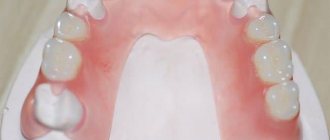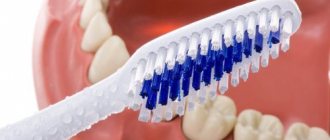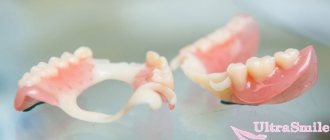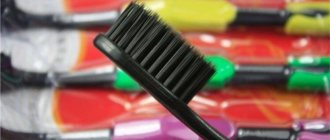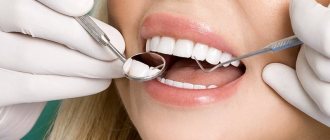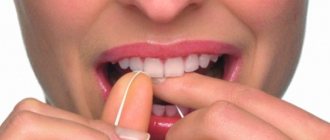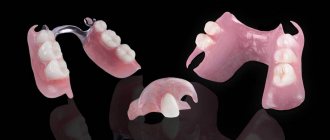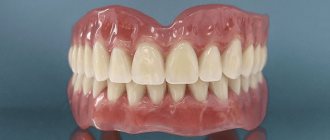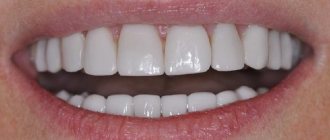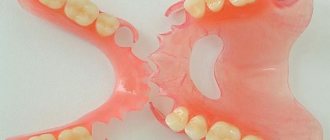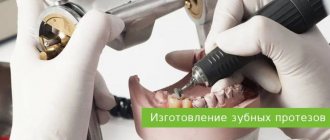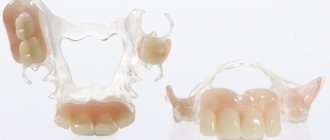During the period when dental implantology is actively gaining momentum, there were, are and probably will remain people who choose removable prosthetics. There are many reasons for this phenomenon, but the most important is the financial affordability of removable dentures compared to products attached to implants. Judge for yourself: the cost of installing a nylon plate prosthesis in Moscow is on average 16 thousand rubles for a design for 1-2 units and 35 thousand rubles for a product for the entire jaw. While the price for one implant prosthesis with a crown starts from 35-40 thousand rubles.
In the recent past, dental prostheses were made exclusively from acrylate mass. It gave the structure the necessary strength and evenly distributed the chewing load throughout the jaw. However, over time, it became clear that for some people such orthopedic products cause more suffering than benefit. For example, it was discovered that acrylic can cause an allergic reaction, and the increased hardness of the denture base strongly rubs the alveolar ridge. In addition, the aesthetics of the gingival margin of the prosthesis were not satisfactory. It is for this reason that dentists continued to search for a more acceptable material for removable orthopedic structures. The attempts were successful, and several decades ago scientists created a fibrous polymer material that met all the requirements for removable orthopedic structures. It had sufficient strength and at the same time flexibility, did not emit toxic substances and had higher aesthetic characteristics. Thanks to the translucent structure, nylon is not so noticeable in the oral cavity, and the gums have a more natural appearance.
What is a nylon prosthesis
Removable nylon dentures are soft orthopedic structures made of a pink, gum-colored nylon base with invisible clasps that hold it in the mouth. The fixation is on the adjacent teeth; the hooks wrap around the supports, keeping the prosthesis stationary on the jaw. Artificial crowns are placed on an elastic frame.
A person can take off and put on a nylon prosthesis without assistance. They are used in dentistry as a temporary solution during implantation (during the process of osseointegration) or as a permanent prosthesis according to indications.
Nylon is a polymer that has the quality of flexibility, and under certain conditions, in the patient’s mouth, softness increases. As a denture material, it has come as an alternative to dental acrylic, to which some people are allergic.
Partial nylon prosthesis RUR 40,000. for all!
The price includes: diagnostics, impressions, manufacturing, installation, fitting and 1 year warranty! Complete denture Akrifri 1 jaw - 47,000 rub.!
Nylon and silicone soft removable dentures
For metal-free prosthetics, structures based on nylon or silicone are often chosen. Despite the apparent similarities, the materials have different properties. Nylon prostheses differ:
- short period of adaptation;
- when wearing, the patient does not experience any discomfort, disturbances in diction or taste;
- The products are simple to use; cleaning is done with special products and soft brushes;
- the structure contains no metal at all;
- excellent imitation of natural fabrics.
Silicone structures are more expensive, but have the following advantages:
- shelf life – from five years;
- increased strength, resistance to loads;
- increased elasticity and softness; when installed, the prosthesis fits very tightly to the gum without causing injury;
- the load is distributed correctly, which prevents bone tissue degradation.
To determine which type of prosthesis is most suitable, it is recommended to consult a doctor. You must undergo an initial examination, based on the results of which the dentist will advise you to choose products made of nylon or silicone.
Stages of manufacturing a flexible prosthesis
To create nylon dentures, you must first treat the teeth, perform removal according to indications, and then proceed to the following steps:
- taking impressions of jaws in a clinical setting;
- plaster models are made in the laboratory;
- a wax prototype of the prosthesis is cast, tried on, and finalized;
- a nylon final version is created, matched to the color of the gum. The equipment used is a heat press, in which polymer granules are melted and an individual mold is poured in a liquid state. After hardening, the structure is polished.
Clasps are a continuation of nylon dentures and are therefore completely invisible on the jaw even when smiling and talking.
Design Variations
In dental practice we use:
- nylon structures;
- silicone products.
Both of them can be in the form:
- complete soft removable dentures;
- structures for partial restoration of a row.
Indications for installation
Indications for removable nylon dentures can be:
- loss of one or more teeth in a row;
- scattered defect;
- absence of all teeth;
- allergy to metal, acrylic;
- if you do not want to grind the supporting teeth for dentures, for example, clasp ones with locks;
- periodontal disease of 1st and 2nd degrees to keep teeth in place (but 3.4 degrees will already be a contraindication);
- patient refusal or medical contraindications to implantation;
- childhood, if necessary, hide early tooth loss;
- as a temporary solution for implantation with delayed loading.
Sometimes nylon dentures can be installed to treat bruxism, involuntary grinding in the mouth, which damages tooth enamel and increases wear. And also for athletes and people involved in traumatic sports, a flexible design is the best option, better than acrylic, which can easily break in case of injury.
Design, features
The nylon prosthesis is a plate structure that is attached to the patient’s jaw as tightly and reliably as possible. Quite often it is installed on a jaw that is completely missing teeth. Flexible removable denture includes:
- A plate that completely replicates the anatomical features of the oral cavity, the color and shape of the teeth;
- Fasteners made of elastic material.
The main distinguishing feature of this design is that there is no need to pre-grind the adjacent teeth, since they fit tightly to the surface of the gum. It has a light pink color, thanks to which it completely merges with the gum and does not stand out against the general background, making it invisible to surrounding eyes.
Contraindications
What may be a contraindication to a nylon prosthesis in dentistry:
- periodontal diseases (grade 3-4 periodontal disease), loose teeth, their displacement;
- recession;
- the height of the supporting teeth is not enough, the clasps will not be able to securely fasten;
- inflammatory processes of the mucous membrane and gums;
- tooth mobility;
- significant bone atrophy.
It is necessary to have healthy teeth on both sides of the prosthesis as supports for clasp fixation.
How much will prosthetics cost?
Prosthetics usually take place in several appointments with a doctor. During the first visit, the patient will have a consultation with an orthopedist and a dental technician, diagnostics, history taking and impressions taken for the manufacture of an individual prosthesis. These services are not included in the cost of the prosthesis and are paid additionally. At the next appointment, the manufactured structure is tried on and adjusted, and recommendations for its care are received.
The price of a denture made of nylon is higher than its analogue made of plastic. Partial replacement of missing teeth in Moscow will cost about 15,000 - 20,000 rubles, complete replacement - about 50,000 rubles. Please note that clinics provide different warranty periods for finished structures. Choose the option that seems most suitable to you.
Varieties
There are:
- mini dentures for 1-2 teeth;
- partial (in the absence of three or more teeth);
- complete (replacing the dentition of the entire jaw).
Many people mistakenly believe that all flexible prostheses are nylon. This is wrong. They are very similar to the touch and in some characteristics. However, they should be considered separately.
Quadrotti prosthesis
A special modern type of prosthesis, which stands somewhere between clasp and nylon. It is more durable than the latter, has a little flexibility, and the fasteners are also not visible, unlike the clasp design, where, perhaps, this is the only drawback. The material of manufacture is monomer-free plastic.
Immediate prosthesis “butterfly”.
This is just a type of nylon prosthesis. It is used in cases where one, or less often, two teeth are missing. Small design, good replacement for a lost dental element. Produced quickly. The supporting teeth are not affected, that is, the doctor does not grind them down, they remain healthy and serve their term.
Dentures on implants
Dentures on implants differ from other removable dentures, since implants are implanted into the gums - the future support of the crown. This option is used in cases of complete edentia, when it is necessary to securely secure the prosthesis in the oral cavity. The procedures are carried out as follows:
- 4 implants are implanted into each gum. This is the optimal number, since with 2 implants in one gum the prosthesis can move, and when installing more than 6 pieces, peri-implantitis (or inflammation around the implant) may develop. You will have to treat the inflamed areas; moreover, inflammation in the oral cavity can cause serious complications.
- Two-piece retainers secure the removable denture. They cling to the prosthesis and seem to snap onto the implants. Fastenings can be push-button or beam.
Advantages of dentures on implants:
- a uniform load on the alveolar ridge of the jaw is maintained;
- the design prevents bone destruction;
- long service life (up to 10 years);
- restoration of aesthetic and chewing function, no effect on speech function;
- high degree of fixation.
The disadvantages include:
- high cost
- long installation process (this is due to the fact that the installation of implants is accompanied by a long period of engraftment - this process takes up to 6 months);
- surgical intervention.
Rules of care and wearing features
In order for the prosthesis to look aesthetically pleasing throughout the entire period of use, you should adhere to simple rules for caring for it:
- brush your teeth and teeth 2 times a day;
- the toothbrush should have soft bristles and the toothpaste should be non-abrasive;
- After each meal, also clean the product or rinse your mouth with water if it is not possible to remove and thoroughly wash the denture;
- take it to the dentist for professional cleaning twice a year;
- do not store in a dry place;
- periodically use a special solution to disinfect and clean removable dentures.
How to care
As practice has shown, people with soft removable dentures do not know how to clean them. They often use everything from soap and water to toothpastes, whiteners and commercial products. The amount of inconsistent and often unproven advice found on the internet is alarming. At the same time, improper care can pose a real threat to both the oral health and the overall health of the user.
We have prepared some recommendations for you from recognized experts from the Netherlands, Belgium, Switzerland, Japan and the UK.
To prevent any oral health problems associated with poor care, they advise:
- Clean your dentures daily with a non-abrasive cleanser (not toothpaste) and a soft brush.
- Soak it daily overnight in a special disinfectant detergent. This will not only eliminate bacteria, but will also prevent drying out and help maintain its shape.
- Get regular dental exams so your doctor can check your overall oral health.
To remove stains from the product, soak the dentures for 8 hours in a solution containing 1 part vinegar and 9 parts water. For a more intensive cleaning, mix 1 part vinegar with 1 part water and let sit for 10-30 minutes. Discuss any questions you have with your dentist!
Advantages
An undoubted advantage is the aesthetic appearance, better than that of acrylic and clasp structures. And:
- light weight, which is a significant factor for the upper jaw, where a person feels every gram of a foreign body;
- small basis. There is no wide part blocking the sky, like the plate analogue, which is much more comfortable;
- quick addiction is due to the two points above;
- “invisible prosthesis”, invisible to others, a person can laugh and talk without hesitation. Nylon, in this sense, is a good material; it perfectly imitates gums. And since the clasps are a continuation of the base and are of the same color, they are attached directly to the gums behind the supporting tooth, so they are not visible. What is an advantage over metal visible hooks of clasp structures and acrylic ones;
- hypoallergenic. The production does not use toxic monomers that are added to the plastic mass of acrylic prostheses. They are the ones who cause allergies in patients. By the way, other alternatives to prosthetics have appeared for such sensitive people - Acry Free;
- there is no metallic taste in the mouth due to the absence of metal in the composition;
- The next plus will be felt by people who have a small mouth. Opening it wide to install a large prosthesis is not very comfortable. But not in this case. Nylon bends easily and does not require such sacrifices from patients.
Flaws
It cannot be said that all the disadvantages that we describe below apply to mini-prostheses. They are the ones who receive the least number of complaints. But larger designs definitely have the following negative nuances:
- uneven load when chewing and discomfort when chewing food. The base is flexible and when bitten it bends even more, all the pressure goes to one area, which causes pain. Since the load is not distributed over the entire prosthetic bed, the tissues underneath it atrophy;
- rapid atrophy. Under any removable denture this process occurs and the height of the alveolar ridge is lost. You can find figures about 1mm per year. Loss of tissue leads to subsidence of the prosthesis;
- damage to the gums in the area of clamp fixation. Unlike the clasp type and the plate type, where the hooks wrap around the neck of the supporting tooth, nylon dentures have a gingival attachment. Therefore, the load when chewing is transferred not to the tooth, but to the gum, which over time injures it;
- a fairly rapid decline in aesthetics. Nylon scratches, becomes sticky over time, and attracts dirt;
- beyond repair;
- short service life - up to 5 years and at the same time the need for frequent corrections.
Service life of a removable soft nylon prosthesis
It is worth noting that the service life lasts up to 7 years with proper care ! This means regular cleaning with a soft brush and rinsing with special soluble tablets, for example, Corega. But do not forget that over time, dentures require adjustment or complete replacement due to age-related changes in the relief of the oral mucosa.
You can find out more about the types and costs of dental prosthetics at the Art Dental clinic here.
The Art Dental clinic provides a whole range of dental services, including removable dentures, performed at a high level and in accordance with the budgetary capabilities of patients.
Expert opinion
Roman Borisovich Alekperov
orthopedic dentist
Experience: 24 years
The choice of flexible prostheses is based mainly on the patient’s desire to receive maximum comfort from wearing an orthopedic structure. Nylon or silicone prostheses do not require long-term adaptation - made from an individual cast, they immediately sit comfortably and allow you to chew food and speak normally. It is important to remember that long-term wearing of flexible prostheses can lead to the development of atrophic processes in bone tissue, since these structures do not have a rigid base. Do not use flexible dentures for more than 6-9 months if you are planning to have implants. If such a situation occurs and the bone is “gone,” it will be necessary to pre-build it or perform basal implantation.
Kinds
Depending on the material used at the manufacturing stage, soft removable dentures are of the following types:
- Nylon - have the highest level of aesthetics. Their base is made of translucent nylon, which perfectly imitates the gum. This design is distinguished by softness, reliability, flexibility, absence of allergic reactions and resistance to food coloring.
- Polyurethane - they require flexible plastic to create. They simultaneously combine the best qualities and significantly lower cost compared to other designs.
Examples of work “Before” and “After”
Partial restoration of teeth on both jaws
Case: partial absence of teeth on both jaws.
Complete prosthetics of the upper and lower jaws
Case: absence of teeth in the upper jaw (completely), absence of an orthopedic structure in the lower jaw on existing implants (installed in the USA two years earlier) Work: production of a complete removable denture in the upper jaw as a temporary structure until the installation of one-stage implants with subsequent prosthetics.
Installation of plate dentures with complete edentia (April 2012)
Case: complete absence of teeth in the upper and lower jaws, weak fixation of the removable denture in the lower jaw.
Complete absence of teeth in the upper jaw
Case: Completely edentulous upper jaw Work: Complete removable plate denture - acrylic Number of visits: 4 Time: 2 weeks Cost: 25,000 rub.
Soft and Flexible Nylon Dentures Pros and Cons:
Nylon dentures
Nylon dentures restore missing teeth when bridges or implants are not possible.
Although these prosthetic options are more optimal and easier to use. Prosthetics with nylon dentures is now one of the options for restoring a large number of teeth, a good alternative to conventional removable dentures. But not in all cases:
Differences between nylon dentures and other removable structures: they are made of nylon, which has elastic properties. Therefore, nylon prostheses are also called flexible or soft. They can bend without breaking, returning to their previous shape after being placed on the teeth.
Soft dentures made of nylon are very durable - they can bend strongly without breaking. It is almost impossible to break them. Unless you apply exorbitant loads, vandalism and playful hands to them.
Let us immediately warn you that the flexibility of removable nylon structures is not rubber-like. Otherwise, while chewing, he will not be able to chew food, he will bend and try to escape his direct responsibilities for grinding food.
Initially, flexible nylon prostheses were invented as temporary structures. To restore missing teeth for several months. Later, the indications for their use were expanded. Because they can solve problems that traditional removable structures cannot handle.
We have been using nylon dentures in dentistry since 2003. We have developed many nuances regarding their use, service life, effect on the gums and teeth, etc.:
Fixation of removable nylon dentures
Soft dentures are fixed to the teeth using nylon clasps.
There is no metal at all. Because of this, their aesthetics are very high. When putting on a nylon prosthesis, its clasps are bent and take their original shape at the moment of complete dressing:
Removal occurs the same way. A spontaneous fall will not happen, since sufficient effort must be made for this to happen.
Flexible dentures hold onto the remaining teeth without any metal clasps, locks or attachments. In case of complete absence of teeth, the retention of a flexible prosthesis occurs due to suction to the gum.
Advantages of nylon dentures
Soft nylon teeth have great advantages over traditional plastic teeth.
They also have disadvantages. First, about the positive aspects. Aesthetics Flexible dental prostheses provide fixation without causing aesthetic damage from metal. This quality of nylon teeth is especially convenient when holding on the front teeth - where metal is not at all appropriate.
Nylon is similar to gum and is translucent, the native gum is visible through it, so nylon dental prostheses look very natural:
Durability Nylon dentures are very durable and almost impossible to break. When pressure is applied to it, it bends, which allows it to cope with heavy loads without any breakage.
Due to flexibility, adaptation and adaptation to soft removable dentures occurs faster. Flexibility ensures strength under heavy loads - if accidentally dropped, they do not break, unlike traditional ones, but continue to work.
When putting on a soft removable denture, nylon clasps bend and tightly hug the supporting teeth, holding it firmly and preventing it from moving.
Weight Soft dentures weigh less than traditional ones made of plastic. The difference is small, but it is there.
Open palate Nylon dentures make it possible not to cover the palate when replacing the upper jaw, since the main retention occurs on the remaining teeth:
The left and right sides are not connected. On the lower jaw, in the absence of teeth on the left and right sides, a conventional removable structure is only possible for the entire lower jaw. In this case, both sides will be connected to each other by a strip of plastic behind the front teeth. This significantly increases the volume, creates discomfort, increases the period of adaptation and impairs use.
Nylon will allow you to make two separate structures. Not related to each other in any way. Saving their owner from many inconveniences.
Hypoallergenic Does not contain allergens. Conventional acrylic dentures can cause allergic reactions.
No need to treat teeth The 99.9% flexibility of a nylon denture allows you to do without treating the supporting teeth. Even if they are not very parallel.
Disadvantages of nylon prostheses
Now about the cons.
Like everything in the world, the positive aspects often turn out to be a place that is turned to the forest in Russian fairy tales. The same is true with flexible dentures. The unique properties of nylon allow it to be used where other options cannot cope. But these same properties also lead to the disadvantages of nylon prostheses: non-repairability. The main disadvantages of nylon prostheses are that nylon does not allow adding additional layers of any material to correct or change it. That is, once a flexible prosthesis has been made, it cannot be changed. When might the need for correction arise?
Soft dentures practically do not break, but if this happens after some extreme and barbaric impact, then it is impossible to repair it. We have to redo it again.
The same applies to the situation when the gums change their configuration (atrophy) after a few years. You can simply add an additional layer to regular plastic. So that it rests on the entire gum, and not just on part of it. This trick will not work with nylon prostheses.
Over time, any removable structure gradually deteriorates in fixation. Nylon is very abrasion resistant. But erasure is still possible over time. Then, due to periodic removal and putting on, fixation may deteriorate. Adding an additional layer of nylon will not work. Just a total remake. Or the use of special adhesives or gels.
If some tooth is removed after a few years. A regular denture will allow you to add an artificial tooth and you can continue to use it. You won’t be able to do this with nylon - you’ll have to do it all over again.
certain conditions for fixation There are situations when the use of nylon prostheses is difficult:
Nylon teeth are made without traditional metal clasps. This makes them very aesthetic, but the inability to add metal to nylon teeth creates certain difficulties in difficult situations when the nylon clasp may not be able to reliably hold the prosthesis. Metal could, but it can't be added to nylon teeth. Because nylon does not allow connection with metal or anything else.
They transfer the load on the teeth only horizontally, and cannot transfer the vertical load as in clasp teeth. More precisely, this can be realized, but due to its elastic properties, a soft nylon clasp prosthesis will not work normally. A flexible clasp is elastic and will bend.
aesthetic nuances Artificial teeth for any
removable structures are made of plastic. And nylon does not connect to plastic in any way. Therefore, artificial teeth are held in it only mechanically. In dentures with conventional plastic, the teeth are chemically connected, which allows the transition of the artificial gum to the tooth to be made more delicately.
The disadvantage of nylon dentures when fixed to the front tooth is that nylon is not completely transparent. With low teeth, this will lead to a visual shortening of the tooth on which it rests. Especially if it's short.
gum atrophy Flexible dentures can cause increased atrophy of the gums, bone tissue and supporting teeth. This is possible due to their elasticity.
Conventional removable designs rely on more chewing volume. Nylon ones bend and load smaller areas of the gums. Therefore, their atrophy may occur earlier.
When a flexible prosthesis has support in the form of its own teeth on both sides, there will be no increased atrophy. If the support is only on one side, it will go faster.
difficulty in polishing Nylon does not polish well. This nuance of working with it is taken into account by technicians during its manufacture. The finished nylon prosthesis will be polished perfectly. But if correction is required, then it is almost impossible for the doctor to polish these areas perfectly without the participation of a dental technician and his equipment by the dentist himself.
True, if performed correctly, corrections are minimal. It is a fact. May other dentists forgive me.
To speed up habituation, improve diction and ease of use in the upper jaw, we often recreate the palatal arches on the prosthesis. They make it very thin (1.5 mm) and more comfortable for the patient. Unfortunately, this cannot be done on flexible dentures due to the poor polishability of the material.
